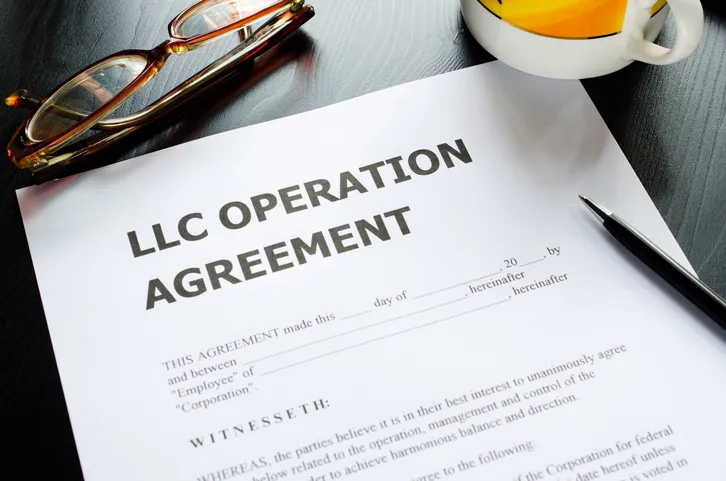Trusts and limited liability companies (LLCs) are both legal vehicles created at the state level that can be used to hold and protect assets, but they serve different purposes. Trusts are commonly used in estate planning to set rules for how assets are managed and distributed over time, allowing the grantor to maintain direction and control rather than focusing solely on tax outcomes, since many trusts do not reduce taxes. LLCs, by contrast, are business entities similar to simplified corporations whose primary function is to shield owners from personal liability for the debts or legal actions of the business, while offering flexibility in ownership and management.
Consider working with a financial advisor as you make key estate planning and business decisions.
LLC Features
An LLC is created by filing documents including a certificate of formation with the secretary of state for the state where the business will be legally based. It is one of the most common types of business entity, along with sole proprietorship, partnership and corporation.
An LLC is a legal entity with an existence separate from its owners. This means that the owners’ personal assets are protected from creditors in the event the business takes on debt that it fails to pay back. Similarly, should the business be required to pay monetary damages as the result of a lawsuit, the payment has to come from the business assets while the owners’ personal assets are protected.
LLCs offer a simplified management structure compared to regular corporations. They also avoid the double taxation levied on corporate profits by passing dividends directly through to their owners, who pay income taxes at their individual rate.
LLCs can also be useful when passing on business assets to heirs. In many states, a business organized as an LLC can be transferred to the next generation without going through the lengthy process of probate. In addition to business assets, the owners of an LLC can place other types of assets in it, allowing more of their estate to avoid probate.
Other advantages of LLCs for investment property owners include:
- Single-member LLCs do not have to file a federal tax return
- LLCs can use 1031 exchanges
- The LLC is the plaintiff during eviction proceedings
Trust Features

Trusts are also organized at the state level and are used to hold assets and transfer them to beneficiaries. A trust is not a business entity, as an LLC is, however, and creating one doesn’t require filing any documents with a government agency. Trusts can hold many different types of assets, including cash and bank accounts, real estate and securities, as well as ownership interests in an LLC or other business entity.
The assets in a trust are transferred from the original owners’ control to the trust, where they are overseen by a trustee. The trust also contains instructions describing how the assets are to be distributed to beneficiaries in the event of the owner’s death.
When the owner dies, the assets do not have to go through the probate process and can significantly reduce the estate taxes that would otherwise be levied on the intergenerational transfer of assets. Rather than going through probate, the trustee just distributes the assets as specified in the trust documents.
Other advantages of trusts for individuals, couples or families include:
- A trust can hold ownership interest of an LLC so the LLC and its assets avoid probate.
- The individual or individuals who create a trust may retain control over the trust assets, including the ability to change or revoke the trust, depending on how the trust is structured. In a revocable trust, the grantor typically maintains control during their lifetime, while an irrevocable trust generally transfers control to the trust itself, limiting the grantor’s ability to modify terms or reclaim assets.
Combining LLCs and Trusts for Asset Protection
In some cases, combining an LLC and a trust can provide more asset protection and simpler estate planning. One common strategy is to create an LLC to own assets like rental properties, investments, or a family business. This can provide protection from creditors or lawsuits.
Doing this will allow you to set up a trust that can hold the ownership interests in the LLC. For example, you could use a revocable living trust that owns membership shares in the LLC. This arrangement makes it easier to transfer LLC ownership to beneficiaries without going through probate.
Combining an LLC and a trust can also help you simplify asset distribution. Because assets like property or businesses are placed into an LLC, and ownership of that LLC is then transferred to a trust, the trust can specify how and when beneficiaries could receive the assets. This will help them save time and money by avoiding probate, and keep those assets out of public record.
Considerations in Choosing to Use One, or Both
While trusts are useful for managing estate taxes, they don’t protect the personal assets from liability to any lawsuits, as LLCs do. They also lack the income tax benefits of the LLC.
The choice between LLC and trust depends on individual situations. LLCs are better at protecting business assets from creditors and legal liability. Trusts can handle many types of assets and are better at avoiding probate and reducing estate taxes. In some cases, both an LLC and a trust may be the best way to manage the estate.
Bottom Line

LLCs and trusts are two legal vehicles used for managing assets and protecting them from liability and taxation. LLCs are a type of business entity that shields owners from liability for business debts and avoids double taxation while providing for a flexible structure to manage the business. Trusts are used as repositories for assets that will be distributed to beneficiaries after the death of the original owner. Trusts help people avoid the time-consuming probate process while minimizing estate taxes. A comprehensive estate plan often entails the comprehensive use of both LLCs and trusts, which can be modified or dissolved at any time by the owner or owners.
Tips on Estate Planning
- Choosing between a trust or an LLC as a tool for asset protection and transfer calls for the assistance of a financial advisor with expertise and experience in evaluating individual circumstances as well as tax exposure, potential legal liability and the probate process. Finding one doesn’t have to be hard. SmartAsset’s free tool matches you with vetted financial advisors who serve your area, and you can have a free introductory call with your advisor matches to decide which one you feel is right for you. If you’re ready to find an advisor who can help you achieve your financial goals, get started now.
- One of the factors going into any decision on estate planning is the amount of money you have to live on in retirement and even pass on to heirs. That’s where a free retirement calculator can provide you with valuable information.
Photo credit: ©iStock.com/maybefalse, ©iStock.com/DNY59, ©iStock.com/FG Trade
